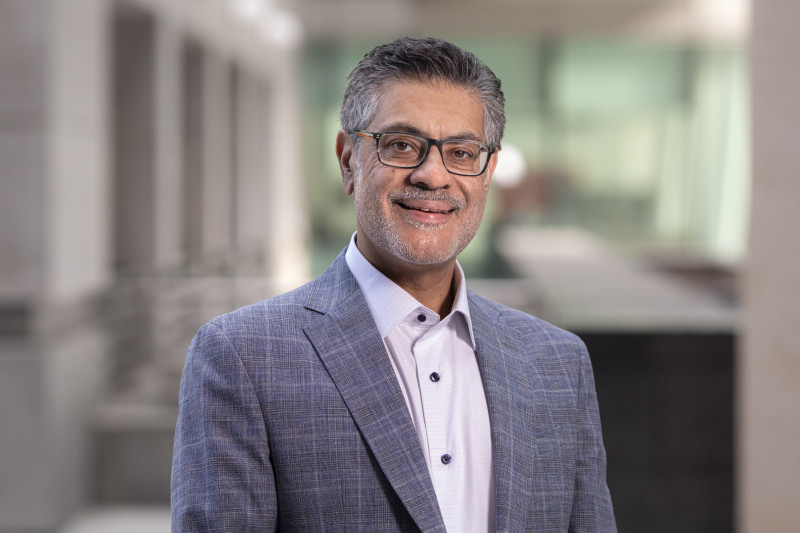Zul Surani: Medical trials, the path to new medications and treatments

The pain medication you’re currently taking, the treatment you’re undertaking, and the lifestyle or diet change your doctor prescribed—all of it is likely the result of a medical trial.
These investigations test new drugs, procedures, devices, or behavioral changes to determine if they are safe and effective to recommend to all the patients with the same ailment or medical issue.
“Research studies show how well a new medical approach works in people,” explains Zul Surani, Associate Director for Community Outreach, Engagement and Partnership & Administrator for the Research Center for Health Equity at Cedars Sinai Samuel Oschin Comprehensive Cancer Institute.
“They test new treatments, find new ways to prevent, detect and treat disease,” Surani adds.
“A lot of the current treatments we have are the result of clinical trials,” he says.
And those treatments came about because a lot of people, from different ethnicities and backgrounds, took part in those trials.

Latinos underrepresented
Latinos, however, are often reluctant to participate in these studies, which can impact the development of treatments tailored specifically to their health needs and can lead to disparities in medical care.
The reasons for this reluctance are varied: language barriers, distrust of the medical system, concerns about privacy, fear of side effects and a lack of knowledge or awareness about these trials.
“People think they’re unsafe and we are trying to let people know there are so many safety protocols in place,” says Surani, who is in charge of many different studies as Administrator for the Research Center for Health Equity, which focuses on addressing health disparities through research, service and policy.
“When a trial is ready, it means it’s been reviewed by scientists and the ethics board,” he adds. “There is so much in terms of protection that goes into trail. We explain to people everything so they know exactly what they’re getting into.”
Through a community grant, they fund, train and educate the ClInica’s “promotoras” program so they can spread the word about the different clinical trials available to them and the importance of joining them.
In some cases, such as when a new drug or treatment is being tested, people benefit immediately from the clinical studies. But in the future it benefits lots of people, Surani notes.
He knows this first hand. His mother, who suffered from kidney failure, was part of a clinical trial testing for a new drug meant to prevent rejection of a transplanted kidney after her procedure.
“The drug actually worked. She was one of the first to benefit from the anti-rejection drug,” Surani recalls.
It’s the same for other illnesses.
“That’s how we make advances in cancer,” he adds of clinical trials.
That’s why he encourages people of different backgrounds and ethnicities to join these medical studies.
“(When Latinos participate) these treatments can also benefit them and their community,” he says.
Partnership with Clínica Romero
Encouraging this participation is part of the work Surani and Cedars-Sinai do through their collaboration with Clínica Romero.
Through a community grant, they fund, train and educate the Clínica’s “promotoras” program so they can spread the word about the different clinical trials available to them and the importance of joining them.
They also conduct cancer education and offer mammography screenings at the different Clínica sites.
“A lot of people have a lot of barriers getting screened for cancer,” Surani says. “This brings the screenings to a place they trust.”
The promotoras can answer questions about the different trials available to patients. Trials are generally free, though at times there may be medical tests necessary along with them that are covered by insurance. Participants may also be compensated for their time, and receive financial help for transportation, if they need it.
And language is not a problem.
“At Cedars-Sinai, we have (Spanish-speaking) navigators that can answer questions and we are training the promotoras on this topic,” Surani says.
Clinical trials don’t always involve new medications. They can also include vaccines, radiation, exercise regimens, blood tests, and a number of other health procedures and treatments.
“We want people to participate to know what is working and not working, what needs more research,” Surani says. “We need all cultures to participate.”
“Trials are beneficial for our health. When they participate, they’re contributing to science. It may help them now and this can be made available to many people in future generations,” he adds.
And if Latinos join medical trials, they’re giving other Latinos a chance to survive. This is especially true when patients or their loved ones are afflicted by cancer.
There are cancer prevention trials, new treatment trials, and studies focused on how to improve their quality of life after cancer.
“This is how we fight disease,” Surani notes.

